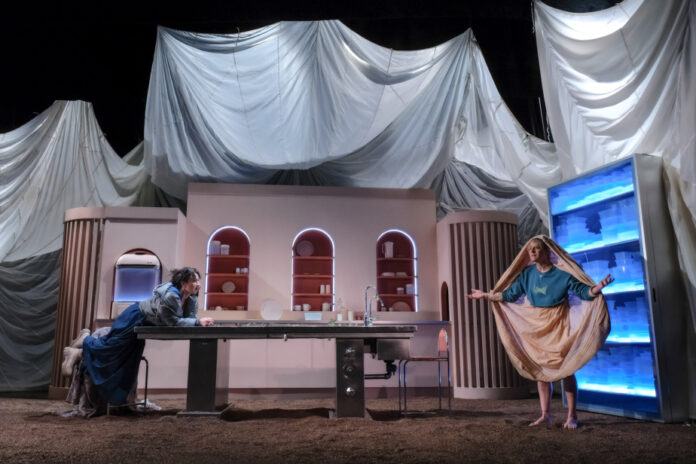We all have a monster inside of us. The bet of art is to manage to make us forget it. A work is successful when it succeeds in transforming the most hideous in the human beast into bursts of intelligence and beauty.
Sarah Berthiaume questions this theme, the relationship between the creator and his creature, in her new piece Wollstonecraft, created last Thursday under the direction of Edith Patenaude. A show that closes the Quat’Sous season devoted to fiction. And she gives birth to an unusual, strange, even bewitching scenic object… but which left us wanting more.
The author was freely inspired by the novel by Mary Shelley, published at the beginning of the 19th century, Frankenstein or the modern Prometheus, to write a futuristic story, close to dystopia. She questions her relationship to creation, as well as motherhood among women. Two things that, in his play, are both “exhilarating and terrifying”. Like the parent with his child, an author never quite knows when and how his “creature” will eventually slip away from him. To live his own life.
Wollstonecraft was the surname of Mary Shelley’s mother. Here, Marie Wollstonecraft (Ève Pressault) is a contemporary author, out of inspiration. His latest novel was very poorly received by critics and literary circles. So much so that, at the dawn of her forties, Marie no longer wants to write a single line. She now devotes her efforts to becoming a mother.
First thrilled, her boyfriend Perceval, a young queer poet played by Jean-Christophe Leblanc, becomes reluctant to give birth to a child. Especially since Marie has had a series of miscarriages and is keeping the fetuses…in the freezer! Her best friend, Claire (Ariane Castellanos), has also put aside her dream of doing theatre. The disillusioned actress is now an “elite” manager at Tupperware. She gives lectures to motivate women to sell the popular brand’s products. By making them aware of the virtues of plastic in general.
Despite the flashes of the pen, the scenes do not fit together well and the story is scattered. We do not believe at all in the bond of friendship between “Madame Tupperware” and the nulliparous woman, because their personalities are diametrically opposed. The text suffers from the improbable marriage between genres. We go from poetic flights to Marie’s miscarriages and her calls for Info-Santé, passing through Claire’s conferences about “women nourishing humanity”, revolution through food, because “without corn, there is no country,” his grandmother would tell him in Mexico City. These comico-political monologues clash with the poetic-futuristic side of other scenes.
When Frankenstein, the child-monster that Marie will eventually create in her kitchen-laboratory, arrives, the room turns to terror. With an ecolo-apocalyptic finale that doesn’t help. Are you still following?
Under the direction of Edith Patenaude, the production team (all female) signs a proposal with problematic aesthetics. Marie’s apartment looks like a laboratory, in which a gigantic freezer lets a blue light pass through, where large white sheets are hoisted covering part of the decor. At times, we have the impression of being in a youth production, the accessories and costumes are so playful, and the game, supported. Note the performance of Ève Pressault, a very gifted actress who captures Marie’s rout well.
Ultimately, if the parallel between creation and procreation is interesting, the piece does not exploit it enough. The author seems to be tangled in the threads of a plot that she has not been able to tame. And we get lost in the chaos of this strange universe.















